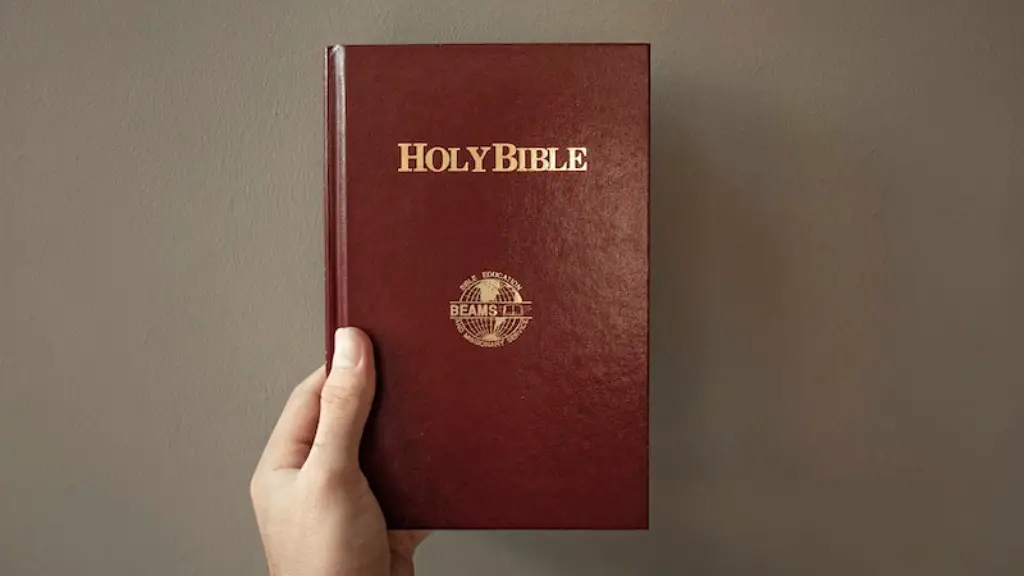The Book of Enoch is an ancient Jewish religious work, traditionally ascribed to Enoch, the great-grandfather of Noah. The oldest parts of the book date from about 300–200 BCE, and the latest part is thought to have been composed around 100 BCE. While it is not part of the Hebrew Bible, many early Christians, including some of the most prominent Church Fathers, considered the Book of Enoch to be an important part of Scripture. But why isn’t the Book of Enoch included in the Bible?
Many theologians believe that the Book of Enoch was excluded from the Bible because it raises difficult questions and its content strays from the accepted standards of the Abrahamic faith. While the Book of Enoch may have been used as a source by several New Testament authors, the book itself was never formally accepted into the biblical canon. Additionally, several Church Fathers, including Augustine, asserted that the Book of Enoch presented material which was not entirely consistent with the teachings of the Bible.
In addition to theological debate regarding the content of the Book of Enoch, religious experts also point to other issues that may have played a role in the exclusion of the text. For example, several Church Fathers noted issues of authenticity, as the book had been lost for many centuries and was finally found in Ethiopia in the 19th Century. Some questioned whether the Book of Enoch found in Ethiopia was indeed the authentic text, and therefore argued against its inclusion in the Bible.
The exclusion of the Book of Enoch from the Bible is further supported by the lack of tangible evidence that the book was ever used in ancient Hebrew tradition. For example, although several New Testament authors appear to reference the Book of Enoch, there is no proof that it was ever accepted into Jewish tradition, as there is with other books of the Bible. Additionally, despite its content being viewed as controversial, the book never underwent the same rigorous examination as other books of the Bible, and its views were not included in the canon.
In summary, the Book of Enoch does not appear in the Bible for a variety of complex theological, cultural and historical reasons. While the Book of Enoch was once an important part of Christian tradition, it was eventually removed and relegated to an apocryphal text.
The Book’s Reception by Scholars
The Book of Enoch has been highly controversial ever since it first began circulating within early Christian circles. Despite its popularity, Enochian scholarship has been met with opposition due to its lack of canonical status. Because of this, the debate regarding the legitimacy of the text has been ongoing among academics and religious scholars alike.
In addition to the book’s canonization, theologians and historians also debate the authenticity of the text, as it was lost for many centuries until it was rediscovered in Ethiopia. While some view the Book of Enoch as an authentic text from antiquity, others point to the text’s possible corruption due to the millennia that elapsed between its alleged creation and rediscovery.
In the midst of these questions, a few modern scholars have attempted to authenticate the Book of Enoch. British Christian scholar R. H. Charles identified and catalogued various fragments of the book to establish its legitimacy. Additionally, in 1973, scholars such as G. B. Gray and G. H. Box compiled and published the text, further contributing to its scholarly acceptance.
Despite claims of the Book of Enoch’s authenticity, several scholars remain skeptical and regard the text with suspicion. In particular, a few academics dispute the book’s authorship, viewing the book not as the work of a single ancient prophet, but as the compilation of various authors operating at different points in time.
The Book’s Contents and Legacy
Although the contents of the Book of Enoch are thought to be older in origin than the book itself, its formal codification likely occurred during the Hellenistic period, a period which spanned from the death of Alexander the Great in 323 BCE to the rise of the Roman Empire in 31 BCE. During this era, Enochian literature was heavily influenced by Greek philosophy, particularly the works of Plato, and combined this Hellenistic-influenced religion with traditional Jewish theology.
The Book of Enoch is composed of five major sections, plus various smaller sections such as hymns and prayers. These five sections are the Book of Parables, the Birth of Methuselah, the Astronomical Book, the Dream Visions, and the Epistle of Enoch. The Book of Parables is arguably the most significant section, as it is practically the only one that is explicitly referenced in the New Testament.
The Book of Enoch is an important source of knowledge that has had an ongoing influence on Jewish and Christian traditions. Even after its exclusion from the Bible, the Book of Enoch has continued to captivate readers, particularly within the realm of apocalyptic literature. Numerous works such as the Dead Sea Scrolls, the New Testament, and the Qur’an make references to Enochian lore, suggesting that the text has withstood the test of time and remains an important part of religious literature today.
Impact on Popular Culture
The influence of the Book of Enoch extends far beyond the realm of religion and spiritual literature. In recent decades, the Book of Enoch has intrigued members of popular culture, particularly those involved in the production of entertainment products. Over the past two decades, the text has been referenced in a variety of works including comic books, television shows, superhero films, and video games.
For example, the 2006 comic series The League of Extraordinary Gentlemen: Black Dossier featured a prominent reference to section five of the Book of Enoch. Additionally, the text has been featured prominently in a variety of superhero movies, most notably Marvel Studios’ Thor: Ragnarok and Marvel-owned television show Agents of S.H.I.E.L.D. More recently, 2019 video game Death Stranding featured an important character known as ‘Enoch’, whose name and role is strongly inspired by the Book of Enoch.
The inclusion of the Book of Enoch in popular culture products indicates that the text is more than just a piece of religious literature. Indeed, the Book of Enoch appears to capture the imaginations of all types of audiences, suggesting that it has a truly lengthy and widespread legacy.
Significance of the Text’s Exclusion from the Bible
The exclusion of the Book of Enoch from the Bible serves as a reminder of the subjective ways in which contemporary theologians and Church Fathers prioritize and evaluate religious literature. While this text was once an important part of early Christian tradition, its exclusion from the Bible is testament to the fact that books of scripture are never beyond revision and subject to dismissal.
Indeed, the Bible has been constantly expanding and becoming increasingly diverse in its composition over the years, demonstrating how religious works and beliefs are continually changing and evolving. This ongoing process of reevaluation serves as evidence of the Bible’s ability to adapt and serve as a representation of cultures and societies worldwide.
The exclusion of the Book of Enoch from the Bible also serves as a tangible reminder that, while ancient texts are important sources of knowledge, they cannot remain unchallenged. In an ever-changing world, the evaluation and revision of religious scriptures allows religions to remain relevant and adaptable, and is an important part of the future of religious literature.
Influences of Other Texts on the Book of Enoch
The relationship between the Book of Enoch and other ancient texts is a highly debated topic among religious scholars. The Ethiopian version of the Book of Enoch, for instance, appears to include passages which bears similarity to the Book of Revelation. Additionally, the Book of Enoch bears notable resemblance to both ancient Babylonian literature, particularly the Epic of Gilgamesh, and to the Dead Sea Scrolls and other Qumran texts.
Themes such as the angel and demon conflict and the Fallen Angel motif, for example, are present in both the Book of Enoch and in the Babylonian and Qumran texts. Furthermore, mythological concepts regarding the origin of evil, the flood myth, the tree of life, and the creation of the world can all be traced to these ancient texts.
The similarities between the Book of Enoch and other ancient works show that the text was not only influenced by other religious works but was also inspired by a variety of literary and cultural sources. The presence of these themes suggests that the Book of Enoch was designed to incorporate beliefs and practices from a variety of cultural backgrounds.
The Book’s Reception in Modern Christianity
The Book of Enoch has long been a source of controversy in Christian circles. While some Christians consider the text to be a legitimate part of Scripture, others believe that it is apocryphal or too mystical to be included in the biblical canon. Despite its controversial status, however, some forms of modern Christianity still embrace the Book of Enoch and use its writings to support their theology.
In particular, several denominations of Messianic Judaism – a modern religion which combines aspects of both traditional Judaism and Christianity – consider the Book of Enoch to be an important source of spiritual knowledge. Additionally, some modern Christian denominations regard the Book of Enoch as a priceless source of knowledge and advice, and some have even begun to incorporate sections of the book into the formal structure of worship.
Despite its exclusion from the Bible, the Book of Enoch has been embraced by modern Christianity and elevated to a place of importance in numerous faith traditions. This shows that, even in the absence of formal canonization, the Book of Enoch is still capable of captivating an audience and inspiring spiritual reflection.





